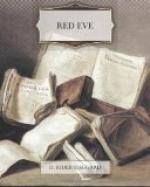As the words left his lips two men came out of the gateway, one of them a physician to judge by the robe and the case of medicines which he carried; the other a very tall person wrapped in a long cloak. The physician was speaking.
“She may live or she may die,” he said. “She seems strong. The pest, you say, has been on her for four days, which is longer than most endure it; she has no swellings, and has not bled from the lungs; though, on the other hand, she is now insensible, which often precedes the end. I can say no more; it is in the hands of God. Yes, I will ask you to pay me the fee now. Who knows if you will be alive to do so to-morrow? If she dies before then I recommend you to throw her into the river, which the Pope has blessed. It is cleaner burial than the plague pit. I presume she is your grand-daughter—a beautiful woman. Pity she should be wasted thus, but many others are in a like case. If she awakes give her good food, and if you cannot get that—wine, of which there is plenty. Five gold pieces—thank you,” and he hurried away.
“Little have you told me, physician, that I did not know already,” said the tall hooded figure, in a deep voice the sound of which thrilled Hugh to his marrow. “Yet you are right; it is in the hands of God. And to those hands I trust—not in vain, I think.”
“Sir,” said Hugh addressing him out of the shadow in which he stood, “be pleased to tell me, if you will, whether you have met in this town a knight of the name of Sir Edmund Acour, for of him I am in search?”
“Sir Edmund Acour?” answered the figure. “No, I have not met him in Avignon, though it is like enough that he is here. Yet I have known of this knight far away in England.”
“Was it at Blythburgh, in Suffolk, perchance?” asked Hugh.
“Ay, at Blythburgh in Suffolk; but who are you that speak in English and know of Blythburgh in Suffolk?”
“Oh!” cried Hugh, “what do you here, Sir Andrew Arnold?”
The old man threw back his hood and stared at him.
“Hugh de Cressi, by Christ’s holy Name!” he exclaimed. “Yes, and Richard the archer, also. The light is bad; I did not see your faces. Welcome, Hugh, thrice welcome,” and he threw his arms about him and embraced him. “Come, enter my lodgings, I have much to say to you.”
“One thing I desire to learn most of all, Father; the rest can wait. Who is the sick lady of whom you spoke to yonder physician—she that, he thought, was your grand-daughter?”
“Who could it be, Hugh, except Eve Clavering.”
“Eve!” gasped Hugh. “Eve dying of the pest?”
“Nay, son: who said so? She is ill, not dying, who, I believe, will live for many years.”
“You believe, Father, you believe! Why this foul plague scarce spares one in ten. Oh! why do you believe?”
“God teaches me to do so,” answered the old knight solemnly. “I only sent for that physician because he has medicines which I lack. But it is not in him and his drugs that I put my trust. Come, let us go in and see her.”




